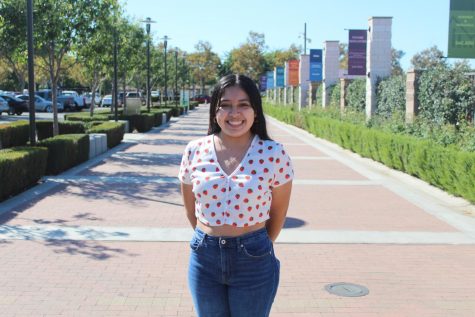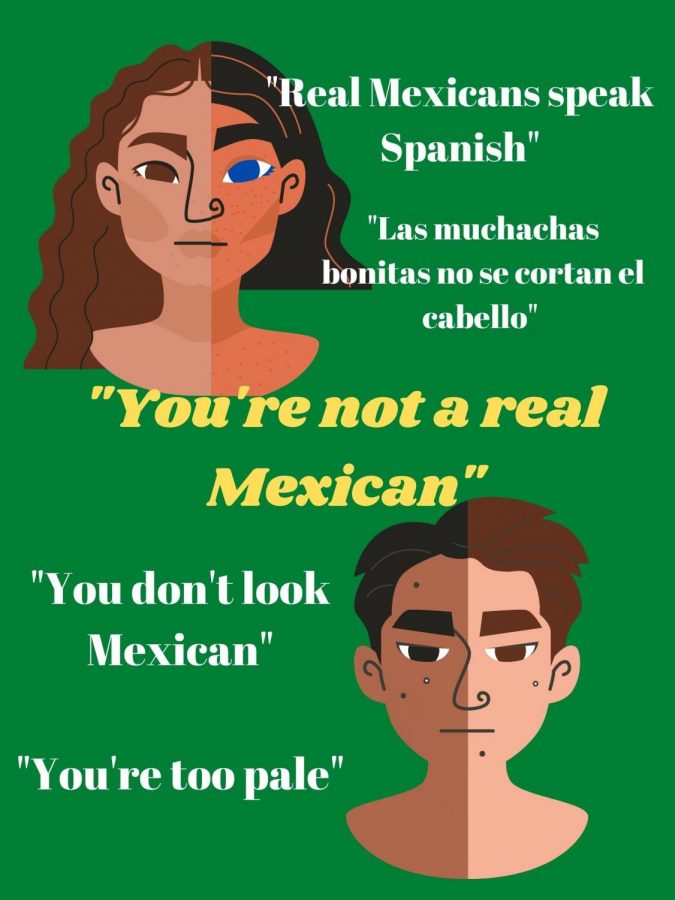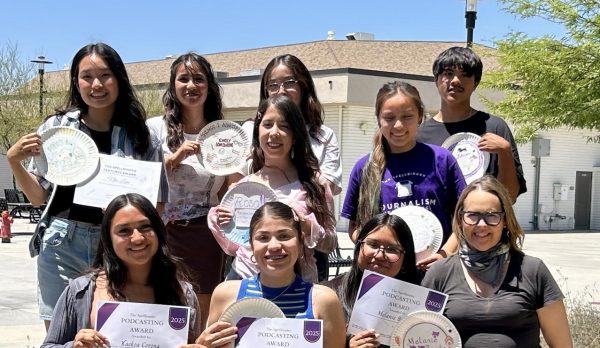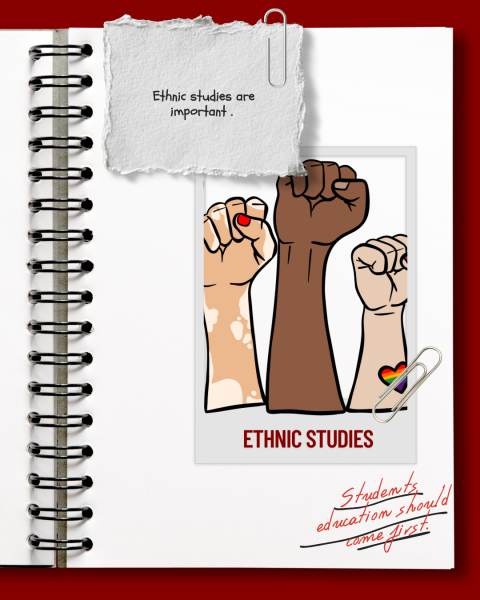Your “Mexican Card” is revoked
Arlene Rufino (Created with Canva)
Being fed negative comments and being stripped of our Mexican card can affect our own identities.
We are all familiar with the beauty standards forced onto us by society. We often find ourselves picking ourselves apart for not fitting these standards, however, we never talk about the beauty standards forced onto us through our own cultures. We’re often told, “You’re not a REAL Mexican” for not fitting into these standards.
“You’re not a REAL Mexican.”
I remember the way those words echoed in my head. As a 1st/2nd generation Mexican-American (as in my dad is an immigrant from Mexico and my mother was born here) I often find myself being criticized and being picked apart by my tias and others around me. Growing up I had dark caramel skin, long dark hair, and spoke Spanish, with little to no knowledge about the English language. However, as I got older, my skin got lighter, my hair was cut short, and I started to lose my native tongue. My peers and family constantly reminded me, “You’re a white washed Mexican.”
I took pride in where I came from, I never considered myself “American.” I was too white-washed to be Mexican, but I was too Mexican to be considered “white.”
I found myself being in between two cultures, which led to my own discovery of the Chicanx community. Chicanx: an American of Mexican origin or descent.
Before my discovery of the Chicanx community and before I felt confident in my identity, I was afraid that changing my appearance would lead me away from the standards that my tias and grandmother held me to.
¨Ya te desgraciaste.¨ (¨You’ve disgraced yourself¨) I remember the hurtful words that came from my grandmother’s mouth after I cut my hair to my shoulders. Constantly being told we don’t fit the standards set out for has always been an issue in our community.
17 year-old Lizbeth Cesareo shared her own personal experiences about not fitting into these standards. “I was born in Mexico… I moved here when I was six… and I have lighter skin and green eyes and since the day I moved here everyone always told me ‘you don’t look Mexican, you’re American,'” she said.
Although these comments and remarks may not seem like such a big deal, they slowly start to tear away at our own identities and leave us confused and lost. We are often told we are privileged to have lighter skin, however, our own community will shut us out and tell us we do not fit in.
“… In a way I would try to act ‘more Mexican’… I really used to care when people used to say ‘You don’t look Mexican.’ It would hurt me cuz I am Mexican, why would you say that I´m not,” said Cesareo. “I felt left out because I wouldn’t look the same way a lot of my family members look.”
Not only are we told that we aren’t real Mexicans, but we are also told we are “too Mexican.” Being proud of where you come from is one of the most beautiful things in life, however, we also tend to be shamed for taking too much pride.
17 year-old Brianna Melgoza opened up about the struggle of being “too Mexican” according to her peers around her at school.
“At my school… We’ve been called ‘hot Cheeto girls’ just because we’re naturally loud and because we’re Hispanic,” stated Melgoza. “I will try to blend in with the white students so I do not stand out as much from them.”
Faye Shimabuko shared her experiences about being an individual who is considered to be “white passing.”
“I personally feel that since I am white passing, I’m not Mexican enough. Which is obviously not true,” stated Shimabukuro. “ I moved from Santa Ana to a white town, obviously looking white; I could’ve been fine. But I was a very proud Mexican because my great grandfather had worked so hard to get into this country and the fact that as soon as someone found out, I was made fun of.”
We are often shamed by our surrounding peers for being proud about who we are and where we come from. Not all of us are first generation or second generation. However, that does give anyone else the right to tear that title away from us.
The standards forced upon us are not just about the color of our skin or the length of our hair; there are other traits that we must have to be “real” Mexicans. We are often told we aren’t “real Mexicans” for not speaking Spanish.
17 year-old Robert Lara shared his experience about identifying as a Chicano, but being bullied for not speaking Spanish.
“I was bullied for not being able to speak Spanish… In sixth grade my friends would say something in Spanish and I wouldn’t know what they said, so I would ask and they would say ‘See you don’t speak Spanish, you’re not a real Mexican’ and that always angered me,” said Lara.
Although speaking Spanish has been implemented in us since a young age, not everyone has the privilege to learn Spanish; however that does not make them any less than the rest of us. Since it is normalized/ pressured that every Hispanic “must speak Spanish,” people from outside our community also push it onto us and shame us for not speaking a language they themselves know nothing about.
17 year-old Madelyn Rodriguez shared about a time her father’s boss (who is not Hispanic) asked why she did not speak Spanish.
“One time with my dad’s boss…. I always spoke English to both of my parents and I was speaking English with my dad and he said his phrase half in Spanish and I responded fully in English and she literally told me and my dad ‘Oh why don’t you teach her Spanish, how come she doesn’t know Spanish?’ and I thought that was so weird to me and I looked at her like, ‘Well she doesn’t speak Spanish either,’ so why am I being judged because I don’t know Spanish?” said Rodriguez.
Rodriguez expressed that she felt that she did not deserve to be judged by someone who did not speak the Spanish language nor did she know much about who she was.
“It was weird being looked down upon from someone who is not a part of my culture, for not speaking Spanish,” stated Rodriguez.
Rodriguez’s parents felt that it was best to teach her English as her first language so she would have an easier time in school. They felt that trying to teach her two languages would confuse her while learning. This is something many parents do in order to help their children; there is no issue with teaching your child only one language. The issue is shaming children who only speak one language and trying to deny their “Mexican card.”
“Back then and even now, I feel that I am not confident enough in my Spanish to speak back to older people. And so a lot of the time I was really looked down on, ‘Oh you’re not really Mexican because you don’t speak Spanish’… like it felt weird, because I did everything, like culturally that Mexicans did, in terms of the food, how we celebrated holidays,” said Rodriguez.
Rodriguez also said, “I don’t know, I always felt at a disconnect because, you know, I wasn’t born in Mexico, but I still felt very Mexican. But the one that a lot of people identify our culture with is our language and that was the one thing I couldn’t participate in.”
Even though Rodriguez was raised to be fully aware about where she came from, she felt that she was disconnected since she did not speak Spanish. She celebrated and did everything our people do, but just one feature she did not possess, made others feel as if they had the right to say she wasn’t a real Mexican.
Although we have come a long way with what we think defines a “real Mexican,” we still have a long way to go. As we start to educate ourselves and share our own experiences, we slowly break down these stereotypes. The color of our skin and the color of our eyes, and the language we speak does not define how Hispanic we are. No matter if you find yourself with lighter skin or dark caramel skin, or with dark brown eyes or colored eyes, or even if you do not speak Spanish, be proud of who you are and where you come from. There is no “right way” to be Hispanic or Latinx. Learning to embrace your culture is one of the most powerful privileges we have.

I’m the middle child of 5 kids, I’ve been featured on GMA, and I love baking.





































